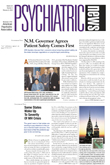When I joined my residency program, I had no idea how much strength there can be in the collective force that residents represent. We residents work long hours and spend the remainder of our time surviving the challenges of daily living. While it is hard to devote already scarce time to the medical organizations that represent and advocate for us, doing so is vitally important—there is absolutely nothing to lose and so much to gain and learn.
APA not only provides academic resources for psychiatry residents but also gives them opportunities to participate in organized psychiatry. Such participation is intended not only for residents interested in becoming leaders in the field but also for residents who want an opportunity to work with prominent psychiatrists, understand how psychiatry is marching forward on all levels, and contribute to its future.
Probably the most visible members-in-training (MIT) in the APA leadership are the MIT trustee and MIT trustee-elect. Currently they are Angela Harper, M.D., and Susan Rich, M.D., respectively. Every year in APA’s election, MITs select an MIT trustee-elect, who serves for a year in that position and then becomes the MIT trustee for a year.
Fourteen members-in-training serve on the APA Assembly’s Committee of Area Member-in-Training Representatives, with each APA Area having one representative and one deputy representative. Every year the Areas elect a deputy representative, who assumes the representative position a year later. To find out the names and contact information of your Area representatives, call your district branch office; district branch information is also posted on APA’s Web site at www.psych.org/dbs_state_soc/db_list/db_info_dyn.cfm.
APA also has many other leadership opportunities available to members-in-training. More information on them is posted on APA’s Web site at www.psych.org/edu/res_fellows/index.cfm.
My election into the AMA Resident and Fellow Section (AMA-RFS) as the APA delegate in May 2003 has enlightened me about how much the AMA-RFS does for residents. It surprised me to learn that many psychiatry residents are not even aware of the existence of the AMA-RFS. After participating in the AMA’s interim meeting in Honolulu last December (Psychiatric News, January 2) and attending the forum for residents and fellows, I thought it might be worthwhile to share my experience with other resident and fellow colleagues.
The AMA-RFS is the largest organization of residents in the United States. It was created in 1974 to represent and advocate for residents, train young physician leaders, and educate residents about issues concerning graduate medical education and national health policies.
The RFS has been very successful at advocating for change in areas such as resident work hours, collective negotiations, resident contracts, working conditions, public health and safety, and resident representation within hospitals and on residency review committees.
The meetings of the AMA-RFS are long and involve a lot of work, but resident leaders are dedicated, and they work hard toward addressing issues of significance to residents and fellows. The group meets twice a year, in June and December, and staff provides several services to members. Information about the section’s activities, as well as policies and opportunities of interest to residents, is posted on the AMA’s Web site at www.ama-assn.org/go/rfs. The site offers a blast e-mail service that sends information to subscribers once a month. To subscribe to the blast e-mail, send your name, the name of your medical school, and your year of graduation to
[email protected].
The RFS also publishes information each month in the “Code Blue” column in Resident and Staff Physician. The AMA provides special financial programs to assist residents, including these:
• Educational loan consolidation program
• Home-mortgage and home-equity loan programs
• VISA credit card
• Car rental program
• AMA-Consulting Link (consulting/attorney referrals)
The RFS Assembly heard 19 items of business, on diverse topics such as the National Resident Matching Program, antitrust litigation, house-staff exemptions from paying the FICA tax, physician privacy for training-related information, medical tort litigation reform, diversity in the medical profession, patient satisfaction and professional regulation, and many others.
The AMA-RFS also submitted four resolutions to the AMA House of Delegates for consideration, addressing issues of workplace safety of health care professionals, medical errors and physician standards, privacy protection of the physician information held by the ACGME, and excessive telephone wait times for physician appeals of managed care decisions.
The first two resolutions were reaffirmed by the house, but it recommended against consideration of the other two. All reports and resolutions considered at the interim meeting can be downloaded now from the AMA’s Web site at www.ama-assn.org/ama/pub/category/11669.html.
I hope this article has stimulated you enough to explore the AMA-RFS’s Web site and become members of APA and the AMA if you have not done so already. You are a resident, and your input matters. We are instrumental in shaping the future of our field. Let us start now. If you have any questions or need information about how to become involved, e-mail me at
[email protected] or Angela Harper, M.D., at
[email protected]. ▪

